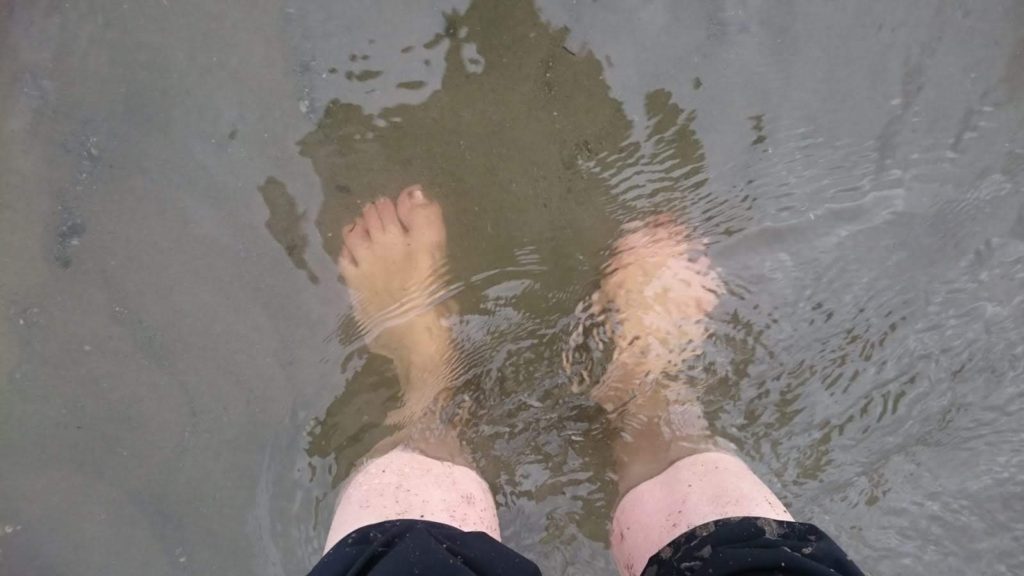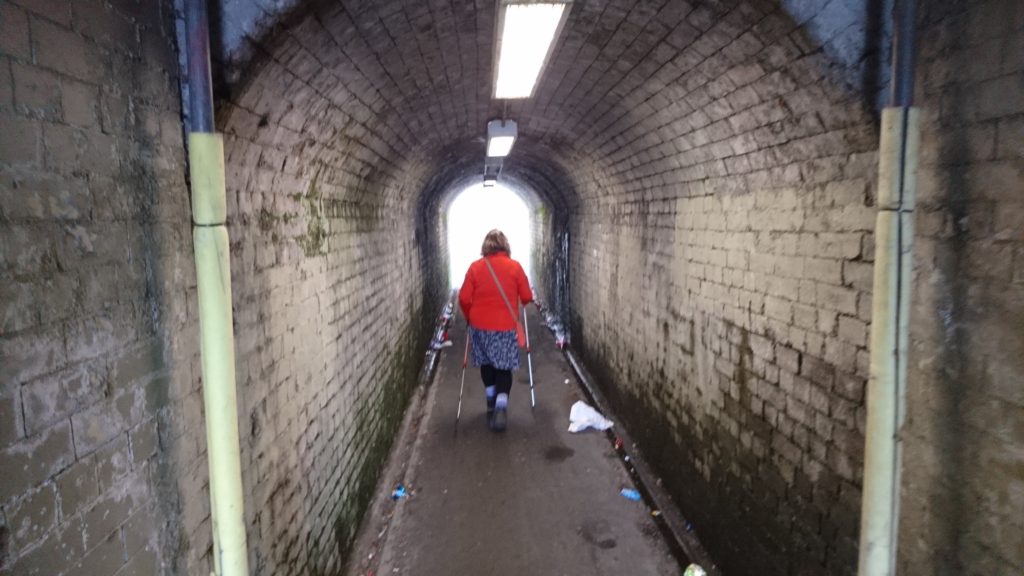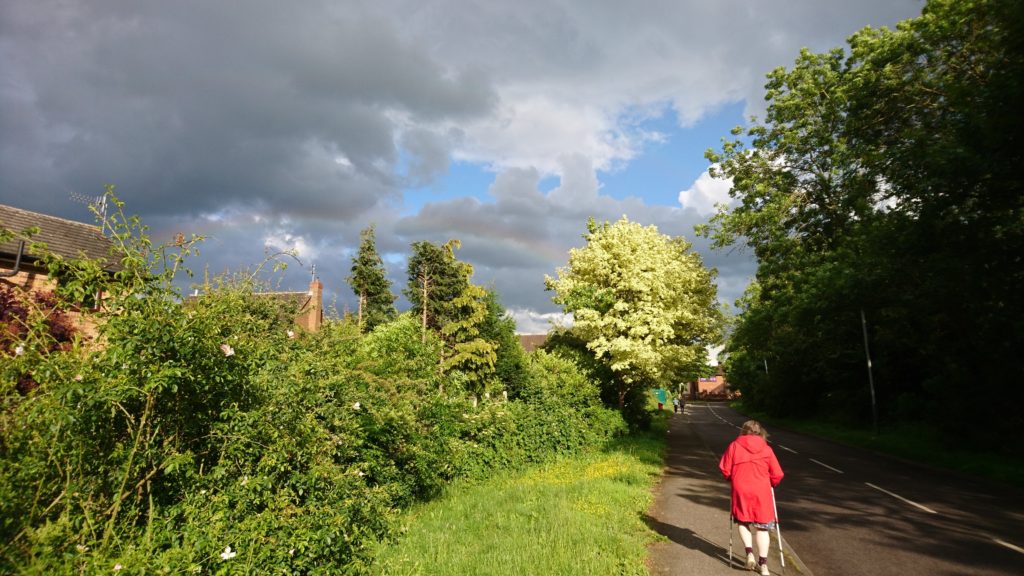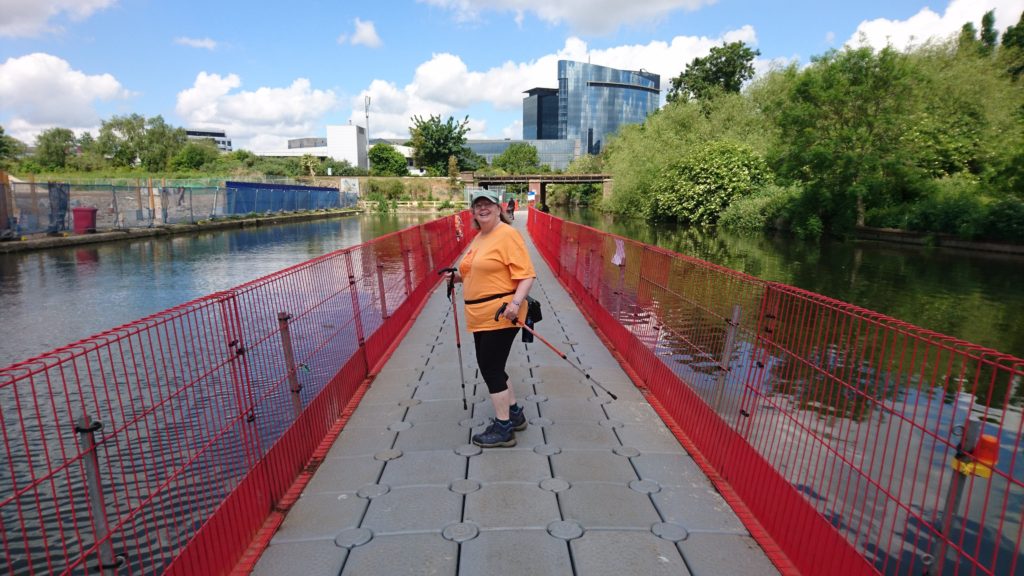Dear Benedict,
Back from our long Spring/Summer Walk I think I better get back to writing to you, about your Rule and living with it in the 21st century. Two human beings many centuries apart, I wonder what we would make of each others lives? You a monastic, me a lay Benedictine in a very different world, both of us wondering about how to be human in community.

At the moment our society is going through a very divisive phase. There are many different attempts to glorify ‘us’ and demonise ‘them’ when in fact of course we’re all members of one race: the human race. Such attempts have been ongoing throughout history. Each Empire has given rise to folks who think they are in some ways superior to another set of people. Within each set rules have developed that segregate, exclude and disadvantage some on the grounds of specific characteristics: for example sex, race, ability, sexuality, gender and income.
Walking seems like a simple thing. The majority of the population can do it and it’s a form of movement seen us defining human evolution, until of course you can’t do it or not very well when all sort of obstacles and challenges appear and you are no longer in the mainstream. At that point discrimination steps in and all the ‘non-walkers’ or ‘poor-walkers’ are excluded from quite large parts of life because of their lack of bipedal motion or their difficulty with it. It’s just one example. One that from a position of current privilege (I can walk) I have experienced the world recently having walked to London and back.

Along the way I meet many other folks and interacting with them found of course that I had more in common with some than others. It was ever thus. Religion is one thing that currently gets bad press. ‘I’m not religious’ countless people tell me. Some add a story of having fallen out of the church or feeling they got pushed out. Mostly religion comes out of it poorly. It was experienced as a set of dogmatic rules and a straight jacket to behaviour that was applied without care or concern by a hierarchy of leaders who were later found, too often, to be suspect at least and dangerous at worst. So much for religion then.
But religious or not, many people share stories and embedded in most of these is a thorny issue of identity. ‘I used to be…’ is a commonly encountered beginning. The one thing we still are, and cannot relegate to the past, is human. So what is it to be human and be united by our attempts to find identity in humanity?
Your Rule offers a group of human who want to live in community a way of living together to discover more about this. But it wouldn’t suit everyone of the humans I know. The idea of rules is coming into question everyday. What is legal or illegal? Can a person legally be illegal? I wonder what it is we don’t like about ourselves that means we want to define people like this.
In a week of weeks this business of being human came up in many forms. A small group of people, whether legal or not, were to be put on a plane, whether they wanted to be on it or not, and taken to another country, whether they wanted to go there or not because another group of people, human like them but not subject to the same rules, had decided, without asking even more people, that it was a good idea, whether legal or not.
Some of the other people who said they didn’t support it were religious leaders. It lead to a further ramping up of the debate about whether being religious and political was tenable or not. Now you need to know that some significant aspects of my faith formation happened in South Africa between 1984 and 1994, a time when the religious and political things was a major issue in that country. Religious leaders had said that discrimination on the grounds of race (and more specifically a way of governing called Apartheid) was morally repugnant and could not be defended on religious grounds. That it had been so defended by a white minority for a long time is a matter of record. It was, to some extent, down to the way people interpreted the bible, a religious things, but it was mostly about being human.
Earlier in the year, one of the leading opponents of that struggle against Apartheid died (I wrote about him then). ‘The Arch’, Desmond Tutu was quite a human but as a religious man he didn’t shy away from the link between religion and politics, and neither do I. ‘When White people came to Africa’, he, a Black African, used to say, ‘They had the Bible and we had the land. They said “Let us pray” and when we opened our eyes, we had the Bible and they had the land’.

It was my time in South Africa that influenced my interpretation of the bible the most. It has been living in Britain in the 21st century that has challenged me to use those interpretative skills the most, including amongst my religious siblings in an out of community. Our shared humanity is not negotiable when it comes to being religious. At the centre of it is One Human who I choose to follow. On the walk someone asked me about that.
A fellow traveller, he described himself as a Pagan and told me he’d been very moved by the companionship and community he’d experienced when taking part in the Camino, that 800 kms centuries old walk across the north of Spain known as the Way of St James. I was walking a few hundred kms on a route of canal towpaths and disused railways in England at the time, but it was my Camino. He asked me what I thought the essence of Christian faith was. For me that comes from me remembered bible: Jesus said ‘Love one another’. He also ‘Follow me’.
He told me he could understand the first but he wasn’t sure about the second point. Why follow? On a towpath or disused railway line this may seem redundant advice. The path has one direction and away we go. But life is not all canal towpaths or disused railway lines, as this week has amply illustrated. How we will decide our direction? What will be our moral compass?
Will it be the further accumulation of wealth and status? Will it be how to bend to rules to suit ourselves and disadvantage some other people? How could it be arranged that my direction is inclusive and encouraging to others such that we travel as fellow humans, thriving in each others company whoever we are.

Some say it’s like that on the Camino. I’ve never been so I can’t comment. But I have been End to End and on a lot of other paths. I have considered how to stop planes from taking off and what to do about food poverty in a rich country. I have though about other human beings, both known and unknown and whilst I’ve not always made the right decision I’m still following the Human One. I’m grateful to all those who keep me company, religious or not.
From my remembered gospel: Jesus said ‘Follow me’.
I journey this day in the name of the Human One
From a Friend of Scholastica and a Member of the Lay Community of St Benedict.
